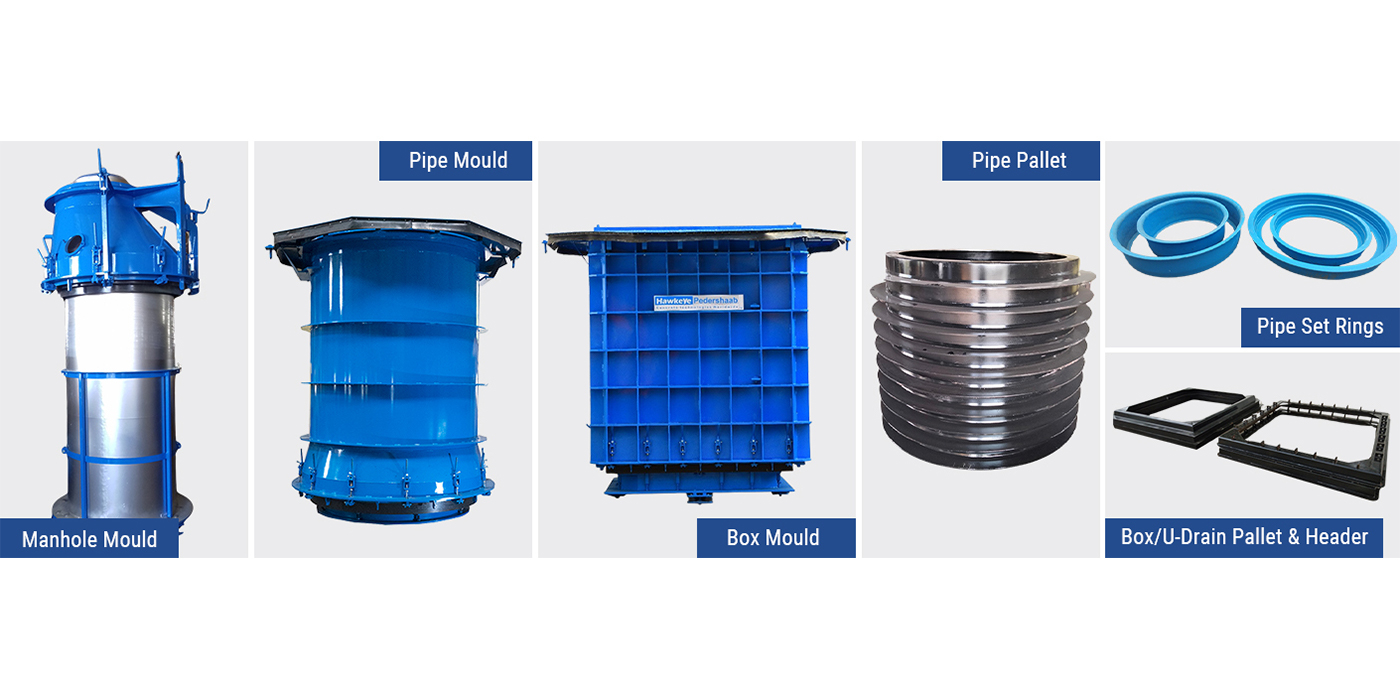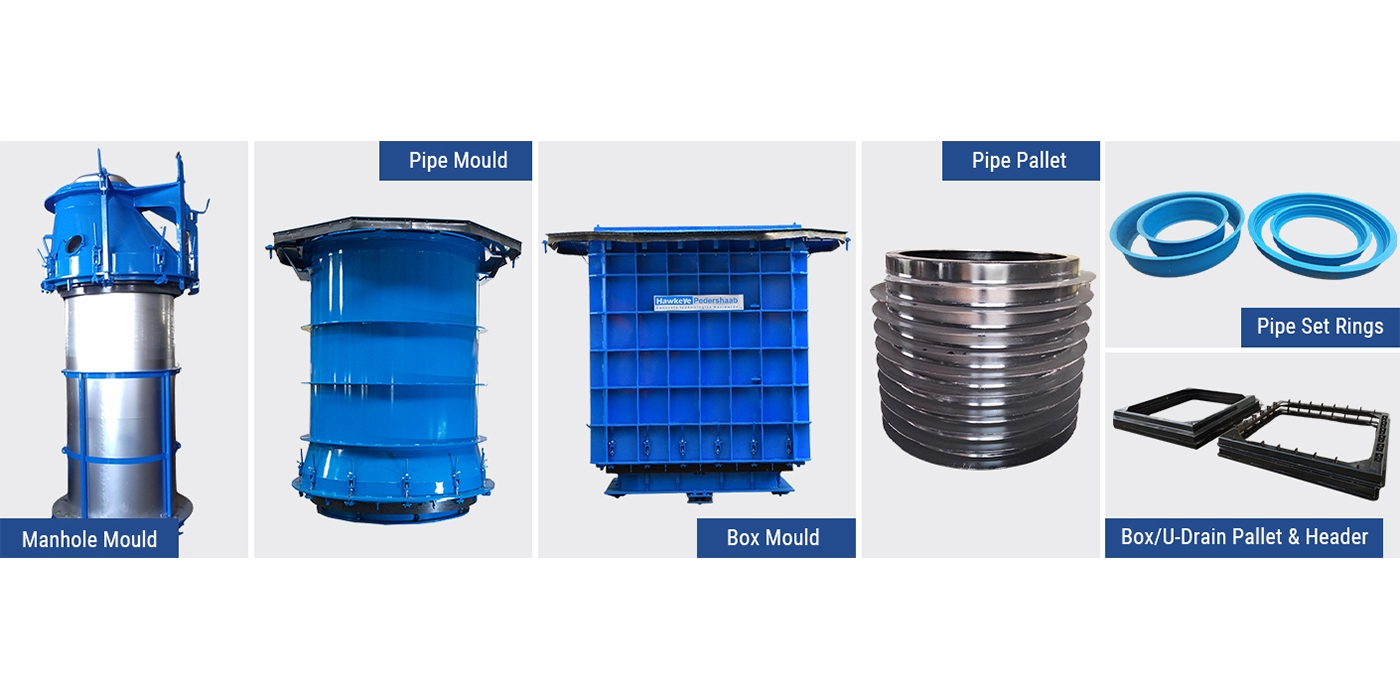
Drycast moulds and accessories play a crucial role in the production of precast concrete products, offering precision, durability, and efficiency. These moulds and accessories are essential in manufacturing various concrete structures, such as pipes, manholes, boxes, and U-drains. This guide explores the different types of drycast moulds and accessories, highlighting their features, applications, and benefits.
1.Introduction to Drycast Moulds
Drycast moulds are used in the drycast process, a method of producing concrete products with a low water-cement ratio. This process allows for the rapid production of strong and durable concrete elements. The moulds used in this process are designed to shape and form the concrete into specific products, ensuring high precision and consistency.
1.1. What Are Drycast Moulds?
Drycast moulds are rigid forms into which dry concrete mix is packed and compacted. These moulds can be used repeatedly, making them an efficient solution for mass production. They are typically made from steel or other durable materials that can withstand the pressure and wear involved in the casting process.
1.2. Applications of Drycast Moulds

Drycast moulds are used to produce various concrete products, including:
- Pipes: For drainage, sewage, and other infrastructure needs.
- Manholes: Essential for underground utility access.
- Boxes: Used in electrical and utility enclosures.
- U-Drains: For effective water drainage in construction projects.
2.Types of Drycast Moulds
There are several types of drycast moulds, each designed for specific applications. Here, we explore the most common types:
2.1. Manhole Moulds
Manhole moulds are used to produce concrete manholes, which are critical for providing access to underground utilities. These moulds ensure the production of durable and dimensionally accurate manholes.
- Features: High strength, precision design, and customizable sizes.
- Applications: Sewer systems, stormwater management, and utility access points.
2.2. Pipe Moulds
Pipe moulds are designed to produce concrete pipes of various diameters and lengths. These pipes are used in water distribution, sewage, and drainage systems.
- Features: Robust construction, easy assembly and disassembly, and long service life.
- Applications: Infrastructure projects, drainage systems, and irrigation.
2.3. Box Moulds
Box moulds are used to create concrete boxes, which are often used as utility enclosures, electrical boxes, or vaults.
- Features: High durability, precise dimensions, and versatility.
- Applications: Electrical and utility installations, underground enclosures, and protective vaults.
2.4. U-Drain Moulds
U-drain moulds are used to produce U-shaped concrete drains, which are commonly used in water management and drainage systems.
- Features: Durable design, accurate shaping, and ease of use.
- Applications: Roadside drainage, agricultural irrigation, and urban water management.
3.Key Drycast Accessories
In addition to moulds, various accessories are essential to the drycast process. These accessories aid in the efficient production and handling of concrete products.
3.1. Pipe Pallets
Pipe pallets are used to support and transport freshly cast pipes during the curing process. These pallets are designed to handle the weight of the pipes and ensure their safe movement.
- Features: High load-bearing capacity, corrosion resistance, and easy handling.
- Applications: Transporting and storing concrete pipes.
3.2. Pipe Set Rings
Pipe set rings are used to maintain the shape and integrity of concrete pipes during the curing process. They ensure that the pipes do not deform and retain their precise dimensions.
- Features: Precision engineering, durable materials, and easy application.
- Applications: Supporting pipe shapes during curing.
3.3. Box Pallets
Box pallets provide support for concrete boxes during curing and transportation. They are designed to handle the weight and dimensions of large concrete boxes.
- Features: Robust construction, anti-corrosion properties, and efficient stacking.
- Applications: Storage and transportation of concrete boxes.
3.4. U-Drain Pallets
U-drain pallets are used to transport and store U-drains safely. These pallets are designed to support the unique shape of U-drains, preventing damage during handling.
- Features: Custom fit for U-drains, sturdy construction, and easy stacking.
- Applications: Handling and storing U-drains in construction sites.
4.Benefits of Using Drycast Moulds and Accessories
The use of drycast moulds and their accessories offers several benefits, making them a preferred choice in the concrete production industry.
4.1. Precision and Consistency
Drycast moulds are designed to provide high precision in the production of concrete elements. This ensures consistency across all units, which is crucial for large-scale projects.
4.2. Durability and Longevity
Made from robust materials, drycast moulds and accessories are built to last. They can withstand the rigors of the casting process, ensuring a long service life and reduced replacement costs.
4.3. Efficiency in Production
The use of drycast moulds allows for rapid production cycles, enabling manufacturers to meet high demand without compromising on quality. Accessories like pallets and set rings further enhance efficiency by facilitating easy handling and transportation.
4.4. Cost-Effectiveness
While the initial investment in drycast moulds and accessories may be significant, their durability and reusability make them a cost-effective solution in the long run. They reduce the need for frequent replacements and repairs, lowering overall production costs.
Choosing the Right Drycast Moulds and Accessories
When selecting drycast moulds and accessories, consider the following factors to ensure you choose the right products for your needs:
5.1. Material Quality
Ensure that the moulds and accessories are made from high-quality materials that can withstand the pressures of the casting process and the harsh conditions of concrete production.
5.2. Customization Options
Choose moulds and accessories that can be customized to meet your specific production requirements. This includes the ability to adjust dimensions, shapes, and other design elements.
5.3. Supplier Reputation
Work with reputable suppliers who have a track record of delivering high-quality moulds and accessories. Check customer reviews and ask for references to ensure you are making a reliable choice.
5.4. After-Sales Support
Consider suppliers that offer excellent after-sales support, including maintenance services, spare parts availability, and technical assistance. This ensures that your equipment remains in optimal condition and any issues are promptly addressed.
Conclusion
Drycast moulds and accessories are indispensable tools in the production of precast concrete products. They provide precision, durability, and efficiency, making them essential for a wide range of construction projects. By understanding the different types of moulds and accessories available, and considering key factors in their selection, you can ensure a successful and cost-effective production process. Whether you are manufacturing pipes, manholes, boxes, or U-drains, investing in high-quality drycast moulds and accessories is crucial for achieving consistent and reliable results.
FAQs - Drycast Mould Equipment
The main types of drycast moulds include manhole moulds, pipe moulds, box moulds, and U-drain moulds.
Drycast moulds are preferred for their precision, durability, and efficiency, which are essential for producing high-quality concrete products.
Essential accessories include pipe pallets, pipe set rings, box pallets, and U-drain pallets.
Ensuring longevity involves selecting high-quality materials, following proper maintenance practices, and choosing a reputable supplier.
Yes, drycast moulds can be customized to meet specific production needs, including adjustments in dimensions and shapes.
Recent Articles
- Precast Concrete Box Culvert for Urban Underpasses and Cable Trenches
- How Concrete Pipe Machines Crucial in Power Plant Infrastructure?
- Role of Concrete Pipe Machines in Canal Lining Projects
- How Drycast Technology is Changing the Concrete Pipe Industry?
- Common Mistakes to Avoid When Selecting Pipe Moulds for Your Machine





 BACK TO ARTICLES
BACK TO ARTICLES